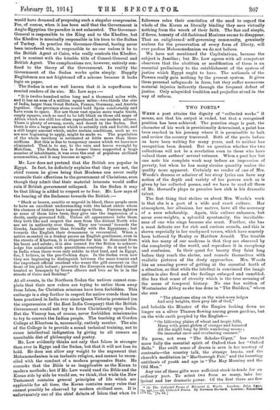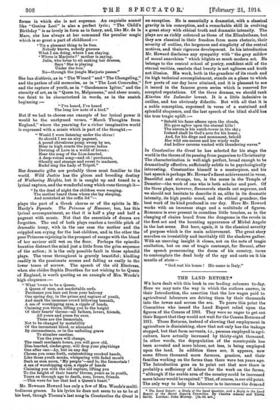TWO POETS.*
WHEW a poet attains the dignity of "collected works" it means, not that his output is ended, but that a recognized position has been achieved. The prentice stage is past, the character of his work is provisionally determined, a point has been reached in his journey where it is permissible to halt and review the country traversed. Both of the poets before us have been -writing for many years, and to neither has recognition been denied. But we question whether the two collections will not be a revelation even to those who have valued these authors' several volumes. When a poet has but one note his complete work may induce an impression of poverty, but when he has many strains quantity makes the quality more apparent. Certainly no reader of one of Mrs. Woods's dramas or admirer of her stray lyrics can have any notion of the depth and variety of her powers such as is given by her collected poems, end we have to read all three of Mr. Howard's plays to perceive how rich is his diamatie talent.
The first thing that strikes us about Mrs. Woods's work is that she is a poet of a wide and exact culture. Her atmosphere, her allusions, her metres, hove all the accuracy of a sure scholarship. Again, this culture enhances, but never over-weights, a splendid spontaneity, the inevitable- ness of one who sings because she must. Further, she NIS a most delicate ear for rich and curious sounds, and this is shown especially in her unrhymed verses, which have scarcely been bettered by Henley or Matthew Arnold. The trouble With too many of our moderns is that they are obsessed by the Complexity of the world, and reproduce it in cacophony and confusion. In their quest for beauty they faint long before they reach the shrine, sod console themselves with . realistic pictures of the dusty approaches. Mrs. Woods his an amazing power of getting at the essential truth of a situation, Bo that while the intellect is convinced the imagi- nation is also fired and the feelings enlarged and ennobled. She has that sense of eternity which is the true meaning of the sense of temporal history. No one has written of Westminster Abbey as she has done in "The Builders," where she sees "The phantoms cling on thy wind-worn ledges And eery heights, thou grey isle of God," and beholds the Minster of the Empire looking down no longer on a silver Thames flowing among green gardens, but on the wide earth peopled by the English- " On billowing plains of wheat and tropic hills, Hung with great globes of oranges and haunted All the night long by little wandering moons; On immortal snow and everlasting summer."
No poem, not even "Tine Scholar-Gipsy," has caught more fully the essential spirit of Oxford than her "Oxford Bells." Her swift sense of drama is seen in her mastery of contrasts—the country talk, the strange beasts, and the church's meditation in" Marlborough Fair," and the haunting antithesis of youth and age in "The May Mornin-g and the Old Man."
Anyone of these gifts were sufficient stock-in-trade for an ordinary poet. To select two from so many, take her lyrical and her dramatic power. Of the first there are few • (it The Collected Pftras of Margaret L. Wo4dr. London: John Lane. [5e. net.1—(2) Colkded roonly. By lionsum Howard. London; Hacrodlaa
forms in which she is not supreme. An exquisite sonnet like "Genius Loci" is also a perfect lyric; "The Child's Birthday" is as lovely in form as in fancy, and, like Mr. de la Mare, she has always at her command the peculiar magic which is so great a part of childhood :— "Tie a pleasant thing to be free.
Nobody knows, nobody guesses What I am doing, where I am staying.
• Where is Marjorie?' mother is saying.
Julie, who loves to sit making her dresses, Says • She is playing Under the tree.'
No—through the jungle Marjorie passes."
She has diablerie, as " The Wizard " and " The Changeling," and the pathos of old memories, as in "The Lost Comrades," and the rapture of youth, as in" Gaudeamus Igitur," and the eternity of art, as in "Queer tie, Melpomene," and sheer music, too faint to be characterized in words, as in the snatch beginning :— " I've heard, I've heard The long low note of a bird."
But if we had to choose one example of her lyrical power it would be the nnrhynied verses, "March Thoughts from England," where the yearning for a richer imaginative world is expressed with a music which is part of the thought :—
" Would I were listening under the olives !
So should I see an airy pageant, A proud chivalrous pomp sweep by me, Hear in high courts the joyous ladies Devising of Love in a world of lovers Hear the song of the Lion-hearted, A deep-voiced song—and oh ! perchance, Ghostly and strange and sweet to madness, Rudd sing the Lady of Tripoli."
Her dramatic gifts are probably those most familiar to the world. Wild Justice has the gloom and brooding destiny of Wild/tering Heights, but it is caught up and tuned to a lyrical rapture, and the wonderful song which rune through it-
" In the dead of night the children were weeping.
The mother heard them where she lay sleeping,
And scratched at the coffin lid "—
plays the part of a Greek chorus or of the spirits in Mr.
Hardy's Dynasts. The Princess of Hanover, too, has this
lyrical accompaniment, so that it is half a play and half a pageant with music. Not that the essentials of drama are forgotten. The end of both plays reaches a terrible pitch of dramatic irony, with in the one case the mother and the crippled son crying for the lost children, and in the other the poor Princess rejoicing in the prospect of escape with the blood of her saviour still wet on the floor. Perhaps the episodic beauties distract the mind just a little from the grim sequence of the action ; it is the only possible fault in these splendid plays. The verse throughout is gravely beautiful; kindling readily in the passionate scenes and falling as easily to the lower tones of sorrow. The speech of the old Electress, when she chides Sophia Dorothea for not wishing to be Queen of England, is worth quoting as an example of Mrs. Woods's high eloquence :—
" What %were to be a Queen,
A Queen of men, not marketable serfs.
Perchance you lean out from your balcony
One spring day, in the prime and rapture of youth,
And mark the immense crowd billowing beneath, A sea of worshipping eyes, a ripple of heads, Claiming you theirs, lifting you to the height Of their hearts' throne—all fathers, lovers, friends, All yours and yours for ever.
These are the Immortals, Not to be changed by mutability Of the inconstant blood, or alienated By circumstance, or in the unfeeling grave To slumber careless.
You the years will change, The small mechanic hours, you will grow old, Dim-hearted, cinder-grey, will drop your playthings One after one—Ay, but on any day Choose you come forth, outstretching crooked hands, Like those youth mocks, whispering with faded mouth
Such as men scorn, 'My people '—and lo, the Immortals !
A sea of worshipping eye., a ripple of bands Claiming you with the old rapture, lifting you
To the height of their hearts' throne, yours as in youth,
Yours on through age to death, sons, lovers, friends.
—This were for her that had a Queen's heart."
Mr. Newman Howard has only a few of Mrs. Woods's multi- tudinous graces. In his lyrics he does not seem to us to be at Isis best, though Theona's last song in Constantine the Great is
an exception. He is essentially a dramatist, with a classical gravity in his conception, and a remarkable skill in evolving a great story with ethical truth and dramatic intensity. The plays are as richly coloured as those of the Elizabethans, but they are classical in their freedom from mere rhetoric, their severity of outline, the largeness and simplicity of the central motives, and their rigorous development. In his introduction Mr. Howard disclaims any sympathy with "the grey mildew of moral anarchism" which blights so much modern art. He belongs to the central school of poetry, confident still of the eternal verities, resolute that beauty is not ugliness and truth not illusion. His work, both in the grandeur of its reach and its high technical accomplishment, stands on a plane to which few poets of our day have attained, and it is pleasant to see it issued in the famous green series which is reserved for accepted reputations. Of the three dramas, we should rank Marian the Icelander lowest, It is a little indecisive in outline, and too obviously didactic. But with all that it is a noble conception, expressed in verse of a sustained and splendid eloquence, and the last speech of the blind skald hag the true tragic uplift :— "Behold his fame aflame upon the clouds,
His pyre aglow upon the eternal hills ! The aurora is his watch-tower in the sky ; Iceland shall be God's acre for his bones, And, for his dirge and monument, behold Her wild sea-nesses and her windy walls
And hollow caverns washed with thundering waves!'
In Constantine the Great be has selected for his stage the world in the throes of its passing from paganism to Christianity The characterization is well-nigh perfect, broad enough to be dramatically effective, sufficiently subtle to be psychologically interesting. Constantine himself is a masterpiece, and his last speech is perhaps Mr. Howard's finest achievement in verse. Beautiful and strange, too, is the scene in the Temple of Demeter—the work of one who is both scholar and poet. Of the three plays, however, Savonarola stands out supreme, and we should not hesitate to describe it as, alike in its dramatic intensity, its high poetic mood, and its ethical grandeur, the best work of its kind produced in our day. Here Mr. Howard works with an immense stage and a multitude of figures. Romance is ever present in countless little touches, as in the clanging of chains beard from the dungeons in the revels in the first net and the haunting appearance of Michel Angelo in the last scene. But here, again, it is the classical severity of purpose which is the main achievement. The great story marches on irresistibly and inevitably till the shadows gather. With an unerring insight it closes, not on the note of tragic exaltation, but on one of tragic contempt, for Strozzi, after the speech pronouncing the doom of his country, turns to contemplate the dead body of the spy and casts on it he mantle of state— "God rest his bones ! His name is Italy."















































 Previous page
Previous page